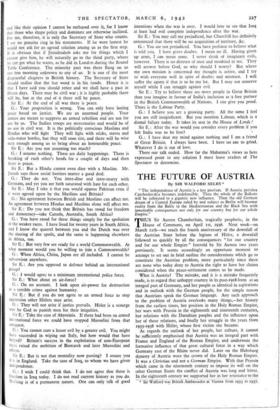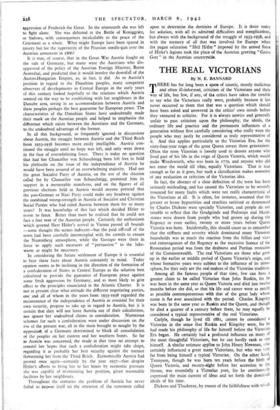THE FUTURE OF AUSTRIA
By SIR WALFORD SELBY* " The independence of Austria is a key position. If Austria perishes Czechoslovakia becomes indefensible. Then the whole of the Balkans will be subjected to a gigantic new influence. Then the old German dream of a Central Europe ruled by and subject to Berlin will become reality from the Baltic to the Mediterranean and the Black Sea with lamentable consequences not only for our country but for our whole Empire."
/VMS Sir Austen Chamberlain, tragically prophetic, in the I House of Commons, on April 1st, 1936. Next week—on March 11th—we reach the fourth anniversary of the downfall of the Austrian State before the legions of Hitler, a downfall followed so quickly by all the consequences "for our country and for our whole Empire " foretold by Sir Austen two years previously. It seems accordingly an opportune moment to attempt to set out in brief outline the considerations which go to constitute the Austrian problem, more particularly since there are none who today deny to Austria the right to have her claims considered when the peace-settlement comes to be made.
What is Austria? The mistake, and it is a mistake frequently made, is to regard that unhappy country in its post-1918 form as an integral part of Germany, and her people as identical in aspirations and in outlook with the German people, for the simple reason that Austrians speak the German language. Any such approach to the problem of Austria overlooks many things,—her history from the earliest times, her position in the Holy Roman Empire, her wars with Prussia in the eighteenth and nineteenth centuries, her relations with the Danubian peoples and the influence upon her of those relations, and finally her struggle in the years from 1933-1938 with Hitler, whose first victim she became. As regards the outlook of her people, her culture, it cannot be sufficiently emphasised that Austria was an integral part with France and England of the Roman Empire, and underwent the formative influence of that great cultural force in a way which Germany east of the Rhine never did. Later on the Habsburg dynasty of Austria wore the crown of the Holy Roman Empire.
It was a Christian and not a German Empire. With that Prussia which came in the nineteenth century to impose its will on the other German States the conflict of Austria was long and bitter.
In the eighteenth century we supported her in her resistance to the * Sir Watford was British Ambassador at Vienna from 1933 to 1937.
aggression of Frederick the Great. In the nineteenth she was left to fight alone. She was defeated at the Battle of Koniggratz, or Sadowa, with consequences incalculable to the peace of the Continent as a whole. What might Europe have been spared in misery but for the superiority of the Prussian needle-gun over the Austrian armament in 1866?
It is true, of course, that in the Great War Austria fought on the side of Germany, but many were the Austrians who dis- approved of the policy of the Austrian Foreign Minister, Baron Aerenthal, and predicted that it would involve the downfall of the Austro-Hungarian Empire, as, in fact, it did. As to Austria's position in regard to the Danubian peoples, many competent observers of developments in Central Europe in the early years of this century looked hopefully to the relations which Austria seemed on the way to be establishing with her neighbours in the Danube area, seeing in an accommodation between Austria and these peoples perhaps the best guarantee for European peace. The characteristics of the Danubian States have undoubtedly made their mark on the Austrian people and helped to emphasise the difference which exists between the Austrians and the Germans, to the undoubted advantage of the former.
In all this background, so frequently ignored in discussions about Austria, the struggle between Austria and the Third Reich from 1933-1938 becomes more easily intelligible. Austria con- tinued the struggle until no hope was left, and only went down in the face of overwhelming force. There is today no question that had her Chancellor von Schuschnigg been left free to hold his plebiscite on the issue of the independence of Austria he would have been assured of an overwhelming majority. Had not the great Socialist Party of Austria, on the eve of the election called for by Chancellor von Schuschnigg, promised him its support in a memorable manifesto, and on the figures of all previous elections held in Austria would anyone pretend that the pan-German or Nazi Party could make any headway against the combined voting-strength in Austria of Socialist and Christian Social Parties who had ruled Austria between them for so many years? It was knowledge of this fact which decided Hitler to resort to force. Better than most he realised that he could not face a free vote of the Austrian people. Certainly the enthusiasm which greeted Herr Hitler's arrival in Vienna passed all bounds —some thought the scenes indecent—but the paid riff-raff of the town had been carefully intermingled with the crowds to ensure the Nuremberg atmosphere, while the Gestapo were there in force to apply such measures of " persuasion " to the luke- warm as might be necessary.
In considering the future settlement of Europe it is essential to bear these facts about Austria constantly in mind. Today opinion seems to be inclining in the direction of the formation of a confederation of States in Central Europe as the solution best calculated to provide the guarantee of European peace against some fresh aggression by Germany, and as most likely to give effect to the principles enunciated in the Atlantic Charter. It is not at present clear what attitude the different negotiating parties, one and all of whom in the years from 1933-1938 regarded the maintenance of the independence of Austria as essential for their own security, propose to take up in regard to Austria, but it is certain that they will not leave Austria out of their calculations, nor ignore her undoubted claims to consideration. Numerous schemes for such a confederation were under discussion on the eve of the present war, all in the main brought to nought by the oppositioh of a Germany determined to block all consolidation of the peoples on her eastern and her southern fronts. So far as Austria was concerned, she made at that time no attempt to conceal her hopes that such a confederation might take shape, regarding it as probably her best security against the menace threatening her from the Third Reich. Economically Austria had proved once again—certainly by the year 1937—that despite Hitler's efforts to bring her to her knees by economic pressure she was capable of maintaining her position, given reasonable facilities by her neighbours.
Throughout the centuries the problem of Austria has never failed to impose itself on the attention of the statesmen called upon to determine the destinies of Europe. It is there today for solution, with all its admitted difficulties and complications, but always with the background of the struggle of 1933-1938, and with the memory of all that was involved for Europe when the pagan salutation "Heil Hitler " imposed by the armed force of Hitler's legions took the place of the Austrian greeting "Grass Gott " in the Austrian countryside.



























 Previous page
Previous page